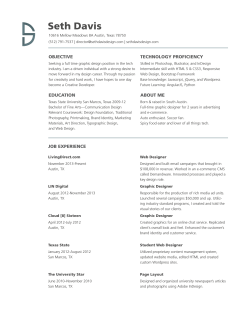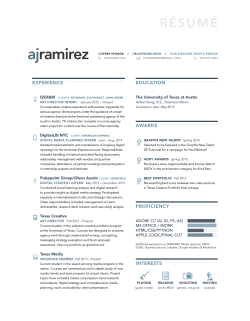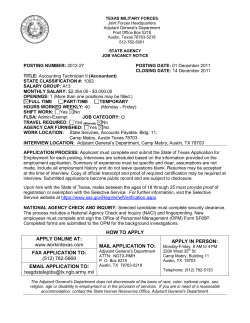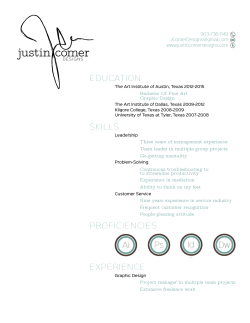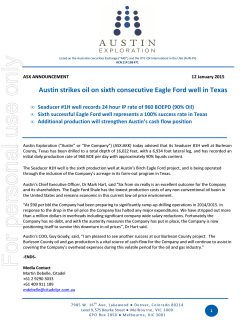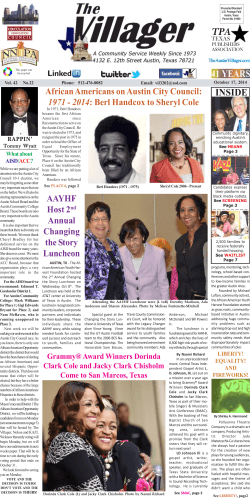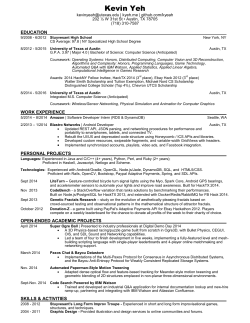
Thematic Faculty Initiative - Division of Diversity and Community
DIVISION OF DIVERSITY AND COMMUNITY ENGAGEMENT Thematic Faculty Initiative Diversity and Community Engagement Through Teaching, Research and Service CONTENTS THEMATIC FACULTY INITIATIVE AT THE UNIVERSITY OF TEXAS AT AUSTIN Thematic Faculty Initiative 4 An Introduction Recruiting Diverse Faculty Two New Hires 5 Dr. Kentya Ford 6 Dr. Miyong Kim Faculty Fellows Bridging University and Community 9 Dr. Jay Banner 10 Dr. Rick Cherwitz 11 Ms. Elizabeth Danze 12 Dr. Kevin Michael Foster 13 Dr. Dorie Gilbert 14 Dr. Edmund “Ted” Gordon 15 Dr. Robert Jensen 16 Dr. Talia McCray 17 Dr. Lisa Moore 18 Dr. Richard Reddick 19 Dr. Maggie Rivas-Rodriguez 20 Dr. Victor Sáenz 22 Dr. Cherise Smith 23 Dr. Shannon Speed 24 Dr. Eric Tang 25 Dr. S. Craig Watkins Dr. Gregory J. Vincent, Vice President for Diversity and Community Engagement Erica Sáenz, Assistant Vice President for Community and External Relations Managing Editor: Leslie Blair, DDCE Director of Communications Writers: Leslie Blair, Virginia Cumberbatch, Joshunda Sanders, Dr. Susan Somers-Willett Proofreader: Ruth Ortiz Design: Ron Bowdoin Photographers: Brian Birzer, Leslie Blair, Bret Brookshire, Nerissa Escanlar, Marsha Miller, Joshunda Sanders Copyright © 2014. All rights reserved. The University of Texas at Austin, Division of Diversity and Community Engagement MESSAGE from Dr. Vincent Dear Friends: The Division of Diversity and Community Engagement (DDCE) continues to shape campus culture at The University of Texas at Austin, bridge academic and local communities, and advance the university’s research goals. We achieve this in many ways, but one cornerstone of our work is our Thematic Faculty Initiative. The Thematic Faculty Initiative not only brings intellectually and culturally diverse faculty to campus; it provides support to faculty members who are conducting inspired research serving underprivileged people and communities. The initiative also offers support for a diverse array of graduate students in the way of assistantships, providing crucial professional experience and scholarly opportunities for students working toward advanced degrees. Ranging from social justice issues to service-learning and spanning fields as diverse as natural sciences to fine arts, the work of our faculty continues to set the pace for research on national and global scales. At the same time, our faculty members connect diverse, underserved communities around the state with the university’s intellectual resoures. The Thematic Faculty Initiative is a key part of the DDCE’s vision of joining diverse people and diverse ideas under the umbrella of one university, ensuring UT Austin remains one of the top research universities in the world. Best wishes, Dr. Gregory J. Vincent Vice President for Diversity and Community Engagement W. K. Kellogg Professor in Community College Leadership Professor of Law THEMATIC FACULTY INITIATIVE • Division of Diversity and Community Engagement • The University of Texas at Austin 3 An Introduction: The Division of Diversity and Community Engagement seeks to transform learning, teaching, research and service in an effort to support an inclusive and diverse environment at The University of Texas at Austin. Key to our work is the Thematic Faculty Initiative that incorporates a three-tiered approach to prepare, recruit and retain faculty. First, to support diverse students as they advance through graduate school and prepare for future academic careers, DDCE hires graduate research assistants who are mentored within the division’s many units and exposed to the value of working in an academic environment committed to diversity and inclusion. Second, in collaboration with colleges and schools across campus, DDCE recruits intellectually and culturally diverse faculty members, providing a line of funding for these hires. And third, DDCE provides fellowships to faculty members across the university whose research, teaching or special projects focus on diversity and community engagement issues. 4 THEMATIC FACULTY INITIATIVE AT THE UNIVERSITY OF TEXAS AT AUSTIN The success of the division’s Thematic Faculty Initiative is clear. The DDCE has helped cultivate the professional careers of nearly 50 outstanding graduate students and the thematic faculty hires have been garnering professional awards and receiving tenure and promotion at an impressive rate. The excellence of faculty recruited through the initiative also contributed to the establishment of the African and African Diaspora Studies Department, which is the only PhD-granting department of its kind in the Southwest. The faculty fellow program actively extends the boundaries of the university to diverse communities across the state, helping the university revolutionize its mission of service. This publication will focus on 16 of our faculty fellows but highlights two recent thematic faculty hires in the Schools of Pharmacy and Nursing. THEMATIC FACULTY INITIATIVE • Division of Diversity and Community Engagement • The University of Texas at Austin Recruiting Diverse Faculty: Two New Hires Student diversity at any university is directly tied to a diverse faculty—students want to know they will find mentors that look like them and have similar scholarly interests as they do. One of the DDCE’s major goals through the Thematic Faculty Initiative is to recruit and retain diverse faculty in order to support and encourage student diversity. Additionally, having a critical mass of diverse faculty is necessary to influence the culture of the university while developing a robust intellectual community. The past few years, the DDCE has been working with colleges and schools that have a STEM (science, technology, engineering and mathematics) or healthcare focus. Dr. Kentya Ford, the School of Pharmacy, and Dr. Miyong Kim, the School of Nursing, exemplify the university’s commitment to transform medical education and healthcare delivery which will be strengthened with the completion of the Dell Medical School. Dr. Kentya Ford Examining Behaviors of African American College Students Dr. Kentya Ford, assistant professor of health outcomes and pharmacy practice, is dedicated to developing courses that can help future pharmacists address the Healthy People 2020 goals to decrease healthcare disparities among underserved populations. “Pharmacists are in community settings and patients have free access to pharmacists,” Ford explained. “If pharmacists have rapport with patients, if they understand how to communicate with patients, they can help explain how to prevent disease and manage disease.” Ford is passionate about getting African Americans to quit smoking given the high rates of early mortality. Through National Institutes of Health and St. David’s Center for Health Promotion and Disease Prevention Research grants, she and an interdisciplinary research team will assess the incidence of cancer-related health risk behaviors and the role THEMATIC FACULTY INITIATIVE • Division of Diversity and Community Engagement • The University of Texas at Austin 5 of culturally based social and environmental factors in the adoption of those behaviors among African American college students. The behaviors include risky sexual behavior, poor diet, tobacco use, alcohol use, physical inactivity — the five most cited behaviors that lead to cancer. The team also will examine family-related factors, peer influence, health literacy and mental health indicators that are associated with the adoption or avoidance of the five behaviors. The two-year longitudinal study will be conducted at Prairie View A&M University, a historically Black college. Ford explained, “HBCUs provide a nurturing environment to a large percentage of our African American students, but there are still unique challenges the students face due to family influence, having families early, needing to work full time, financial challenges, and mental health indicators. These all play a role in the students’ potential for success even in that supportive environment.” Ford said the initial NIH grant will help her advance this particular line of research to larger studies. “When you look at overarching health outcomes, we can help develop interventions to prevent negative risk behaviors and make a real difference in health outcomes,” she said. 6 Dr. Miyong Kim Advancing Healthcare Through CommunityBased, Trans-Disciplinary Research Professor of Nursing and DDCE Associate Vice President for Community Health Engagement Dr. Miyong Kim has dedicated much of her career to community-based participatory research (CBPR) as a means of improving cardiovascular health among traditionally underserved communities. Kim came to The University of Texas at Austin from John Hopkins where she directed the Center of Excellence for Cardiovascular Health of Vulnerable Populations. Kim brought her passion for CBPR to UT Austin. She said that it takes about 17 years for original research to make a difference in patient care. Through community-based participatory research, the return is more immediate and involves a great understanding of local communities and cultures. “We like to combine community capacity building with a line of scientific inquiry,” she explained. THEMATIC FACULTY INITIATIVE • Division of Diversity and Community Engagement • The University of Texas at Austin Kim is developing a graduate-level class on CBPR that would involve students working with various community organizations to plan community health projects together. She also has been active with a local Social Medicine Committee that focuses on the most urgent community healthcare concerns in the region including improving maternal health outcomes for African Americans and Latinas, cardiovascular health for underserved communities and health literacy factors. The City of Austin has appointed Kim to the Asian American/Pacific Islander Quality of Life Commission as well. Since arriving in Austin last summer, Kim has set her sights on establishing a national model, the Center for Trans-Disciplinary Collaborative Research in SelfManagement Science (TCRSS), and has applied for National Institutes of Health funding. She envisions the interdisciplinary center as one that will develop, test and disseminate innovative self-management solutions to improve the health outcomes of people with chronic conditions. It will include a community engagement core that will facilitate meaningful participation of relevant stakeholders and community entities and establish an infrastructure for trans-disciplinary research. The Center for TCRSS partners will span the university and include collaborations with non-health-related disciplines including education, law, technology, business and engineering as well as health service organizations, other nursing institutions and community organizations. “The bottom line,” said Kim, “patients are changing, communities are changing. We academicians do healthcare research in traditional ways — in silos. We need to break out of those silos. Trans-disciplinary research is the solution.” THEMATIC FACULTY INITIATIVE • Division of Diversity and Community Engagement • The University of Texas at Austin 7 Faculty Fellows: Bridging University and Community The DDCE faculty fellows are selected for their innovation and creativity in helping to address challenges in communities through research and service. The 16 fellows profiled here have been making a difference among diverse communities, addressing issues such as male academic performance, access and equity with regard to social services and education, and quality of life in the Austin area. Three of the fellows—Drs. Rick Cherwitz, Victor Sáenz and Eric Tang—have long affiliations with the DDCE and manage initiatives that are housed within the division. 8 THEMATIC FACULTY INITIATIVE • Division of Diversity and Community Engagement • The University of Texas at Austin Dr. Jay Banner Hot Science, Cool Talks Inspire Students and Community Dr. Jay Banner has been interested in science since he was a boy growing up in New York City. After attending the University of Pennsylvania and SUNY Stony Brook, Banner joined the University of Texas faculty in 1990. He is currently the Distinguished Teaching Professor in the Department of Geological Sciences at the Jackson School of Geological Sciences and director of the Environmental Science Institute at UT Austin. Through a series of lectures called Hot Science–Cool Talks, Banner has presented free, informal public lectures by nationally recognized scientists for the past 15 years. Recent scientists have included Dr. Robert Bullard, widely known as the father of environmental justice; Dr. Glen Lightsey who specializes in the dynamics and control of space vehicles; and Dr. Kerry Emmanual, an atmospheric scientist who has testified before Congress regarding climate change. The series is supplemented by interactive learning activities and teaching resources for an audience of 5th–12th grade students and teachers, university students and Austin residents. “It’s been an honor to become a DDCE faculty fellow,” said Banner. “The resources associated with the fellow position were instrumental in bringing a program on environmental justice to the Environmental Science Institute’s outreach series, Hot Science–Cool Talks. It was gratifying to hear the positive response to this program from so many members of the UT and Austin community.” THEMATIC FACULTY INITIATIVE • Division of Diversity and Community Engagement • The University of Texas at Austin 9 Dr. Rick Cherwitz Students Take Charge of Their Educational Experience through IE Dr. Rick Cherwitz started the Intellectual Entrepreneurship (IE) program in 1997 while in the Office of Graduate Studies. Since 2003, IE has evolved into an inter-collegial consortium and since 2007, IE has been part of the Division of Diversity and Community Engagement. Cherwitz refers to the Pre-Graduate Internship Program, which allows students to work on projects that engage them with their communities, as the crown jewel of IE. “In 2012–13, 320 students enrolled and worked with over 150 UT faculty and graduate student mentors,” he said. “Over 70 percent of IE interns this year are either economically disadvantaged, come from underrepresented populations or the first to attend college in their families.” The award-winning and nationally recognized program has recently produced stellar students and scholars like Jordan Metoyer, an IE Pre-Graduate Intern who was selected as a Truman Scholar and Ana Laura Rivera, one of 20 students nationwide accepted into the Public Policy and International Affairs Fellowship Program at Carnegie Mellon. IE has been recognized by many, including Excelencia in Education and the Texas House of Representatives. The program continues to grow and last year received funding from the Michael and Alice Kuhn Foundation to support 12 first-generation students who participate in the IE Pre-Graduate Internship and to support their mentors each year. Cherwitz said, “Because of the Kuhn’s generosity, IE hopes to attract an even larger number of first-generation and economically disadvantaged undergraduates — many of whom might not otherwise contemplate or be prepared for graduate study.” 10 THEMATIC FACULTY INITIATIVE • Division of Diversity and Community Engagement • The University of Texas at Austin Elizabeth Danze A Sociological Approach to the Built Environment Professor Elizabeth Danze is a fellow of the American Institute of Architects and principal with the award-winning Blood and Danze Architects, named associate architects for The University of Texas at Austin campus master plan. However, Danze’s contributions to UT Austin campus go beyond design. Integrating practice and theory across disciplines by examining the merging of sociology and psychology and their intractable linkage with space, design and construction, she exemplifies DDCE’s dedication to innovative research and community engagement. Danze has presented numerous papers and articles on affordable housing design and architects’ contributions to community development. She is assistant director for design for The Veteran’s Community Park and Pavilion Project, an Austin-based project that will create a place for veterans and their families to interact with the general public — people in our community who know little or nothing of what it is like to be a solider or veteran. A perfect example of her sociological and interdisciplinary approach to architectural design, Danze co-taught a studio on this project with adjunct professor Stephen Sonnenberg, M.D., and architect and senior lecturer John Blood, an advanced design studio in the School of Architecture. Students were asked to conceptualize and design a building that would provide a conducive environment and communal venue for veterans to share their experiences with one another and the local community. “Being a DDCE fellow has given me the opportunity and resources to examine important societal issues within an academic and societal context,” said Danze. “I am optimistic that through projects such as these, we will create awareness of the characteristics necessary for the creation of a better built environment for all.” THEMATIC FACULTY INITIATIVE • Division of Diversity and Community Engagement • The University of Texas at Austin 11 Dr. Kevin Michael Foster BlackademicsTV Showcases Black Faculty, Connects Black Studies to New Audiences Dr. Kevin Michael Foster is an anthropologist who takes pride not only in his widely published academic research, but also in applying that research to community service. He founded and is the host of BlackademicsTV, a partnership with public television station KLRU that showcases the work of African American faculty, several of them DDCE faculty fellows. Blackademics TV highlights issues and research in Black studies to a broad audience in the form of 12–15 minute talks by leading scholars from around the nation. The program’s topics have covered education, performance, public policy, Black popular culture and Black arts. Two recorded events, one in April 2011 and another in February 2013, were attended by more than 500 Central Texas students, community members and leaders. The first six-episode season culled from 13 filmed talks was broadcast to 1.6 million Central Texas households in 2013 with periodic re-runs on a second KLRU cable channel. This isn’t Foster’s first time as a DDCE faculty fellow. He was the division’s very first fellow as the founding director of the Institute for Community, University and School Partnerships (ICUSP) and co-founder of COBRA (Community of Brothers in Revolutionary Alliance), an academic development and leadership program for boys in high school. Foster’s primary academic appointment is within the African and African Diaspora Studies Department, and he is a member of the College of Education Curriculum and Instruction graduate faculty. Through his work and myriad volunteer efforts, he aims to serve African American students and extend the reach of Black studies in general. “I’m committed to scholarship that has direct impact on broader communities,” he said. “We’re trying to push the envelope on communityengaged scholarship and generate new insights.” 12 THEMATIC FACULTY INITIATIVE • Division of Diversity and Community Engagement • The University of Texas at Austin Dr. Dorie Gilbert Widening the Scope of Service-Learning Dr. Dorie Gilbert, associate professor of Social Work and African and African Diaspora Studies, was recently named a DDCE faculty fellow. Gilbert is director of the Institute for Community Development (ICD): US and Abroad, which brings together interdisciplinary scholars and students with community members to implement projects in domestic and international locations using an academic service-learning model. Initiatives currently include a rural community revitalization project in Mart, Texas; a rural village development project in Patriensa, Ghana; and two programs in East Austin. Gilbert teaches the Ghana Maymester Study Abroad course, which was awarded the Longhorn Center for Civic Engagement’s 2012 Tower Award for Outstanding Service-Learning course. Since 2009, 108 UT students have worked alongside Ghanaian students implementing service-learning projects for agencies and schools in Ghana. In a new partnership with DDCE’s Longhorn Center for Civic Engagement (LCCE), Gilbert’s highly regarded course, Global Project Development, will incorporate The Project, UT’s largest student-led community service event. In 2014–15, the Global Project Development course will provide leadership training for the LCCE students who are organizing and implementing community development projects as part of The Project in Austin’s Holly Street neighborhood. The course will also include students who will be part of Google Leaders, a new partnership between DDCE, the City of Austin, the Colony Park neighborhood and Google. As a DDCE Fellow, Gilbert will be building the ICD’s capacity to conduct outcome research to evaluate the impact of service-learning projects on students’ personal and academic growth and document the benefits to communities that these students serve. THEMATIC FACULTY INITIATIVE • Division of Diversity and Community Engagement • The University of Texas at Austin 13 Dr. Edmund “Ted” Gordon A Career of Building Intellectual, Cultural Diversity Dr. Ted Gordon has been a faculty member at The University of Texas at Austin since 1988. He accepted a tenure-track position in the Department of Anthropology on the condition that the department would actively seek another faculty member of color. Gordon has played an active role on campus since then, pushing for intellectual and cultural diversity among faculty and helping to build a pipeline for graduate students of color. He is credited with developing the Thematic Faculty Initiative on campus after the Hopwood decision struck down the use of affirmative action. The Thematic Faculty Initiative focuses on the gaps in scholarship, intellectual interests and academic expertise instead of race or ethnicity. When the Division of Diversity and Community Engagement was formed in 2007, Gordon became associate vice president for thematic initiatives and community engagement. When the African and African Diaspora Studies Department was established in 2010, Gordon assumed the role of chair of the innovative department, leaving DDCE. He has continued, however, to play a role in the thematic hiring initiative as a faculty fellow and has helped recruit not only faculty but graduate students for fellowships. “Every year less than 3 percent of graduate students are African American and that’s a problem,” he said. “The percentage of Latino students has been around 5 or 6 percent.” Because of the decentralization of graduate student funding, Gordon sees programs like the thematic initiative as “one of the best ways to increase diversity in graduate fellowship.” 14 THEMATIC FACULTY INITIATIVE • Division of Diversity and Community Engagement • The University of Texas at Austin Dr. Robert Jensen Advancing Grassroots Activism and Social Justice Efforts in Austin Dr. Robert Jensen is one of several faculty fellows affiliated with the DDCE Community Engagement Center in East Austin. He is the author of several books, the most recent published in 2013 — Arguing for Our Lives: A User’s Guide to Constructive Dialogue. The former journalist is now a widely published expert on feminism and race. He is also a grassroots activist and professor in the College of Communication. Jensen is a founder of Third Coast Activist Resource Center, an Austin nonprofit established to strengthen the local activist network that is part of a national and international movement for global justice. The resource center co-owns 5604 Manor, home to the labor cooperative Cooperation Texas and the Worker’s Defense Project, a local organization and former DDCE incubator project that empowers low-income workers to achieve fair working conditions. In the past couple of years, Cooperation Texas has helped establish Red Rabbit Bakery, which sells vegan pastries at local farmers’ markets, as well as Dahlia Green Cleaning Services. “We’re working to create a space for undocumented workers to have community,” Jensen said. “I help facilitate that at 5604 Manor and help bring UT’s intellectual resources into the community.” Since the building was acquired in 2010, Jensen says 5604 Manor has hosted speakers committed to global justice like Natalie Byfield from St. John’s University. The hub has also established a community garden and worked on developing a neighbor-to-neighbor wellness center at the Freedom School with Gina Houston, daughter of civil rights activist Ora Houston. Jensen has also started doing work with the Welcome Table, Inc., a 501(c)3 based at St. James Episcopal Church that supports healthy lifestyles for low-income families. THEMATIC FACULTY INITIATIVE • Division of Diversity and Community Engagement • The University of Texas at Austin 15 Dr. Talia McCray Studying Transportation, the Built Environment and Public Health Around the Globe After majoring in mathematics and electrical engineering at North Carolina A&T, Dr. Talia McCray was named to USA Today’s All-USA College Academic Team as one of the “The Best and the Brightest.” With an interest in urban communities, social patterns and resource access, she pursued her Ph.D. in urban technological and environmental planning from the University of Michigan. Her Ph.D. led her to rural South Africa to study prenatal care utilization patterns and writing her dissertation, Promoting the Journey to Health: Healthcare Access and Transportation in Rural South Africa; to Quebec City as a Ford Foundation post-doctoral fellow to study low-income women’s travel patterns; and finally to Providence, RI, to study low-income teenagers’ activity patterns and safety perceptions. The University of Texas at Austin welcomed McCray’s expertise in January 2008 when she became a faculty member of the School of Architecture Community and Regional Planning Program. In 2013 as a FulbrightScotland visiting professor at Glasgow Urban Lab she explored and developed techniques that demonstrate the social and communal patterns of urban, public spaces. The University of Texas at Austin with the continued support of DDCE, has provided a platform for McCray’s ongoing exploration of transportation policy and planning, healthcare access and how the built environment affects public health, and sustainable transportation solutions for disadvantaged communities. 16 THEMATIC FACULTY INITIATIVE • Division of Diversity and Community Engagement • The University of Texas at Austin Dr. Lisa Moore INSPIRE-ing Women, LGBTQ Community Dr. Lisa Moore joined The University of Texas at Austin community in 1991 and is currently serving as associate professor of English and Women’s and Gender Studies. With a specific focus on queer studies, Moore is a prolific writer, and author of several books, such as Dangerous Intimacies: Toward a Sapphic History of the British Novel and over 30 articles exploring gender studies within the 18th and 21st centuries. Her contributions to the field have stretched beyond her writing and even the classroom. As the interim director for the Center for Women’s and Gender Studies (CWGS), she led a team in creating the Performing Justice Project, to build performance-based curricula on gender and racial justice. The project has since developed into several efforts both working with women in a local juvenile detention center and the creation of the INSPIRE program. Since 2009, the INSPIRE program has served as the university’s signature leadership program for women undergraduates. The program provides participants with the opportunity to be both educated and empowered to express their voice in their community. “I’m extremely proud of the work of the CWGS this year, as we continued to expand our programming,” shared Dr. Moore. “In 2013 we introduced the new interdisciplinary certificate in lesbian, gay, bisexual, transgender and queer (LGBTQ) studies and for the first time we are bringing together the more than 25 faculty at UT whose research centers on how ideas about sexuality shape our world.” Dr. Moore continues to drive the expansion and the impact of the CWGS with the support of the Division of Diversity and Community Engagement and hopes that with programs like the INSPIRE leadership program and the availability of scholarly study through the LGBTQ certificate she will continue to help serve the university’s vision for diversity, inclusion and education. THEMATIC FACULTY INITIATIVE • Division of Diversity and Community Engagement • The University of Texas at Austin 17 Dr. Richard Reddick Scholarship at the Forefront of Educational Pipeline Research Dr. Richard Reddick is a native Austinite who graduated with honors from Johnston High School in 1990. As a current assistant professor in the College of Education’s Department of Educational Administration and as a DDCE faculty fellow, Reddick pursues research on mentoring in light of current education policy using a social/cultural capital framework. His analysis, presented in a white paper, “Considering African American Population, Crime, Education and Mentoring Constellations,” became the basis for constellation mentoring programs for young African American men organized nationwide with members of the fraternity Sigma Pi Phi. Reddick draws on his personal and professional career trajectories to research “homecoming” faculty of color — professors like himself who are teaching and researching at institutions where they also attended as undergraduates — as part of successful recruitment and retention strategies. Reddick earned his undergraduate degree from The University of Texas at Austin in the Plan II Honors program and went on to receive a master’s degree and a doctorate from Harvard University. He joined The University of Texas at Austin in 2007 as a tenure-track professor in the College of Education. He holds appointments in the John L. Warfield Center for African and African American Studies, the Department of African and African American Diaspora Studies and the Gender and Sexuality Center at The University of Texas at Austin. Reddick is an award-winning teacher and scholar, the recipient of the spring 2009 Eyes of Texas Excellence Award, 2012 Outstanding Young Texas Ex Award, the John L. Warfield Center for African and African American Studies Faculty Teaching Award, and the Black Faculty and Staff Association (BFSA) Faculty Member of the Year Award. 18 THEMATIC FACULTY INITIATIVE • Division of Diversity and Community Engagement • The University of Texas at Austin Dr. Maggie Rivas-Rodriguez Transforming Historical Narratives through Latina and Latino Voices The U.S. Latino and Latina World War II Oral History Project founded by DDCE fellow Dr. Maggie Rivas-Rodriguez, is nearly 15 years old. It has grown in recent years to include the stories of Latino and Latina veterans from the Korean and Vietnam eras and was rebranded in 2010 as VOCES Oral History Project. Rivas-Rodriguez founded the project in 1999 after she earned a Ph.D. in mass communication from the University of North Carolina at Chapel Hill as a Freedom Forum doctoral fellow. VOCES combines several hundred interviews and contemporary photographs. A $428,000 grant from the Institute for Museum and Library Services made it possible for Rivas-Rodriguez to expand the project to include the eras beyond World War II. “We are only able to do our work because there are good men and women across the country who are committed to documenting the Latino experience in our country,” Rivas-Rodriguez said. “They understand the importance to current and future students of including Latinos in our nation’s historical narrative and are committed to supporting our mission.” Rivas-Rodriguez is a veteran journalist and Longhorn who discovered her love of journalism at The University of Texas at Austin and graduated with honors in 1976. She went on to work for United Press International as well as other journalism outlets in Dallas and Boston before serving as a bureau chief for the Dallas Morning News in El Paso. She became a faculty member at the UT Austin School of Journalism in 2004. The oral history project gained national prominence in 2007 after Rivas-Rodriguez led protests in response to the lack of Latinos included in a preliminary version of Ken Burns’ documentary, “The War.” (Burns later added Latinos to the seven-part documentary). Rivas-Rodriguez relies heavily on volunteers and her staff to do the labor intensive work of editing the oral histories that the project has committed to accept for the next several years. “We need to have the continuity to make sure that we’re presenting as high quality and accurate a story as possible.” THEMATIC FACULTY INITIATIVE • Division of Diversity and Community Engagement • The University of Texas at Austin 19 Dr. Victor Sáenz Expanding Conversation and Opportunities for Male Student Success Across Texas In the fall of 2010, Dr. Victor B. Sáenz, an associate professor in the Department of Educational Administration, officially launched an ambitious new research and mentoring effort called Project MALES (Mentoring to Achieve Latino Educational Success). Based within DDCE, Project MALES employs a twopronged approach — research and mentoring — to address the ongoing crisis facing Latino males in education. In less than three years, this initiative has garnered state and national attention for its innovative model of translating research into action as well as partnering with local organizations, including Communities in Schools of Central Texas. In 2013 Project MALES hosted its third UT Latino Male Symposium, a gathering of education professionals and researchers working to change the nature of the conversation around Latino males in education. Even as the number of Hispanics attending college and attaining degrees has increased steadily in recent years, the achievement gap and proportional degree attainment for Latino men compared to any other ethnic population continues to widen. In future years, the symposium will transform into a UT Male Student Leadership Summit, part of a new initiative that will expand collaboration across the state of Texas. 20 THEMATIC FACULTY INITIATIVE • Division of Diversity and Community Engagement • The University of Texas at Austin Sáenz and Dr. Luis Ponjuan, associate professor at Texas A&M University, launched the Texas Education Consortium for Male Student Success in 2013. The consortium expands the work of Project MALES and focuses on improving Hispanic and African American male student success across the state of Texas. The consortium is made up of higher education and K-12 institutions across the state, and it seeks to align and coordinate existing programs and services that target underrepresented male students throughout the education continuum. Sáenz was invited to participate in the White House Initiative on Educational Excellence for Hispanics in January. He said, “My primary contribution to the dialogue was to focus attention on how we need to ‘problematize’ this issue in ways that are constructive and purposeful, and I drew from the many years of research I’ve been conducting on Hispanic males. I urged the group to consider that there is still a dearth of research on this topic, all at a time when the Hispanic community continues to drive demographic growth in this country.” Dr. Luis Ponjuan (left) and Dr. Victor Sáenz at the 2013 Latino Male Symposium held on the UT Austin campus. In addition to being a DDCE faculty fellow, Sáenz has a faculty appointment with the Center for Mexican American Studies and is a faculty associate with the UCLA Higher Education Research Institute. THEMATIC FACULTY INITIATIVE • Division of Diversity and Community Engagement • The University of Texas at Austin 21 Dr. Cherise Smith Examining Identity through Art Dr. Cherise Smith, an associate professor who joined The University of Texas at Austin faculty in 2005 in the Department of Art and Art History, examines how identity is negotiated in performance art. In October 2012, Smith was named the associate director of the John L. Warfield Center for African and African American Studies. Her status as a faculty fellow for the division since 2008 has supported her work exploring the “other” in terms of racial, ethnic and gender questions and in bringing renowned and rising African American artists to campus for presentations. Smith’s book Enacting Others: Politics of Identity in Eleanor Antin, Nikki S. Lee, Adrian Piper, and Anna Deavere Smith was published in 2011. 22 THEMATIC FACULTY INITIATIVE • Division of Diversity and Community Engagement • The University of Texas at Austin Dr. Shannon Speed Human Rights Activist Scholar Dr. Shannon Speed, associate professor of anthropology and director of the Native American and Indigenous Studies (NAIS) program, admits to coming to academia as an activist. “Politically engaged research was at the heart of what I was interested in doing,” she said. In 2007 she was one of the five founders of the interdisciplinary program and has been a guiding influence since them. As a Chickasaw citizen, she has a strong background in the politics of North American tribes. She has written extensively on the struggles of indigenous peoples and human rights issues, especially in Chiapas, Mexico. Her recent research and writing has focused on indigenous women in immigrant detention and indigenous justice spaces. Last fall, Speed was named Chickasaw Nation Dynamic Woman of the Year for 2013 and in January received the Lifetime Achievement Award from the State Bar of Texas Native American Law Section. For ten years she has been leading the organization of the Abriendo Brecha Activist Scholarship Conference on the UT Austin campus. This year, she is taking a lead role in the Native American and Indigenous Studies Association annual meeting to be held May 29-31 in Austin, confirming the increasing prominence of the NAIS program. “It has been a great honor to be part of the growth on the Indigenous Studies Initiative, begun in the DDCE in 2007, into the Native American and Indigenous Studies program. Our students and programs continue to thrive, and in the last two years we have gained national and international recognition,” said Speed. “As more people learn about our outstanding programs, more and more native and indigenous students choose to come to UT, and contribute to a diverse campus with their presence. It is inspiring to watch!” THEMATIC FACULTY INITIATIVE • Division of Diversity and Community Engagement • The University of Texas at Austin 23 Dr. Eric Tang Social Justice Institute Dr. Eric Tang was first appointed a faculty fellow with the Division of Diversity and Community Engagement in 2008 as a visiting professor in African and African American Studies and the Center for Asian American Studies. Since then, he has established the Social Justice Institute at the DDCE’s Community Engagement Center. As director of the institute, Tang oversees projects that engage typically underserved populations in the Austin area. Tang was instrumental in putting together a key panel as part of the 2013 Heman Marion Sweatt Symposium, “The Future of Black Life in Austin,” drawing on research he has conducted related to displaced African American communities in East Austin. This research project, entitled “East Avenue” is a collaboration between the Social Justice Institute, the Warfield Center for African and African American Studies and several community-based groups. A New York native with more than a decade of community organizing experience, Tang is a natural fit for his role at the Social Justice Institute which has collaborated with Grassroots Leadership, Refugio: Community Organizing trainings, the Workers Defense Project and Red Salmon Arts among others. “My work looks at the poetics of displacement — from third-world refugees to the African American communities throughout Austin,” Tang said in an interview with the American Studies department. “Why poetics? Because the violence of displacement necessarily produces among the displaced a specific way of knowing the world — a theory and a form. Some scholars refer to this as a methodology of the oppressed. My goal as a scholar is to ensure that contemporary society does not squander their vision/theory/method.” 24 THEMATIC FACULTY INITIATIVE • Division of Diversity and Community Engagement • The University of Texas at Austin Dr. S. Craig Watkins Plugging in to Youth, Technology and Social Media Dr. S. Craig Watkins, associate professor in the Department of Radio-Television-Film at the University of Texas, focuses on increasing digital access for youth and people of color. “I’m most passionate about looking at matters of equity and trying to examine and understand how access to technology is unevenly distributed in terms of race or class,” he said. Watkins, a faculty fellow for the Division of Diversity and Community Engagement, earned his Ph.D. from the University of Michigan in 1994. Since then he has become a member of the MacArthur Foundation’s research network on connected learning and a sought after expert on young people and digital access. His research methods are as unique as the books and articles he’s written on the topic of youth interaction with digital media. He visits high school students at school and at home employs both qualitative and ethnographic approaches to examine their engagement with media. His most recent book, The Young and the Digital: What the Migration to Social Network Sites, Games and Anytime, Anywhere Media Means for Our Future, is based on that in-depth fieldwork. “A lot of people consider my work to be relevant and timely,” he said. “It really responds to and addresses a lot of the critical discussions about youth, technology, education and 21st-century skills.” THEMATIC FACULTY INITIATIVE • Division of Diversity and Community Engagement • The University of Texas at Austin 25 DIVISION OF DIVERSITY AND COMMUNITY ENGAGEMENT Thematic Faculty Initiative DIVERSITY AND COMMUNITY ENGAGEMENT THROUGH TEACHING, RESEARCH AND SERVICE To learn more about the Division of Diversity and Community Engagement and our programs and initiatives, visit our web site WWW.UTEXAS.EDU/DIVERSITY To support the work of the DDCE visit WWW.UTEXAS.EDU/DIVERSITY/GIVE DIVISION OF DIVERSITY AND COMMUNITY ENGAGEMENT The Division of Diversity and Community Engagement advances socially just learning and working environments that foster a culture of excellence through diverse people, ideas and perspectives. We engage in dynamic community-university partnerships designed to transform our lives. WWW.UTEXAS.EDU/DIVERSITY Division of Diversity and Community Engagement The University of Texas at Austin Flawn Academic Center, Suite 402 2304 Whitis Avenue, Mail Stop G4600 Austin, Texas 78712 • 512-471-2557
© Copyright 2026
